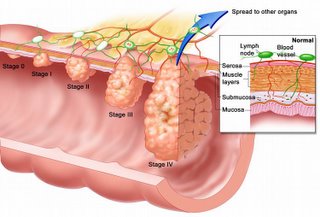
Last week I indicated that I would be either more or less worried as a result of the planned colonoscopy procedure for this week. Well, I guess I’m more worried. As the sedative was taking effect, I asked the gastroenterologist whether I would be informed immediately of anything discovered during the procedure. He indicated that I probably wouldn’t remember much of anything, but that he always delivers bad news quickly.
As it turned out, either the procedure was very short in duration or I simply was too sedated to care one way or the other. But we did speak again immediately afterwards. He found a large growth in the rectum and took a biopsy, but he strongly suspects cancer. Today I confirmed a follow up appointment with him for tomorrow afternoon, but it is likely we will schedule surgery as soon as possible.
This morning I spent time preparing OneNote entries for the online research I began regarding colorectal cancer. It truly is amazing what a remarkable fund of information is available online. Not only could I find useful information geared to either the physician audience or the general audience, but I also found diagrams specifically illustrating the stages of rectal cancer. My hope now is that we have caught the cancer (the lab results still have to confirm this) in an early enough stage to give me a good prognosis.
Here are just a few of the hyperlinks that I found useful:
- Canadian Cancer Society’s “Treatment for Colorectal Cancer”
- National Cancer Institute’s “Colon and Rectal Cancer”
- Cancer Care Ontario’s “Cancer Incidence and Mortality in Ontario, 1964-2002”
- Grand River Regional Cancer Centre
- Ontario Cancer Trials – drug treatment trials in Ontario
I have also ordered a couple of books through chapters.ca which should arrive in a few days. They are:
- Colon & Rectal Cancer, by Lorraine Johnston
- What Your Doctor May Not Tell You About Colorectal Cancer, by Mark Pochapin
One of the more interesting videos available online may not be as current as I’d like, but it does arm the patient with knowledge about survival rates for surgery for rectal cancer. In 1999 the difference could be as high as 700%, depending on which surgeon performed the operation and what method of excision was used. According to the BBC report, TME (total mesorectal excision) excises rectal cancer which has spread beyond the wall of the rectum by removing all the fat as well. The cancer is described as similar to a crab in jelly. The goal is to lift the jelly out of the jelly mould without breaking off the claw of the crab. Otherwise, the likelihood of local recurrence increases dramatically. If there is local recurrence, then 90% of those people will die from cancer.
I guess I’ll be asking for a surgeon with very low local recurrence rates who uses the TME technique.

No comments:
Post a Comment